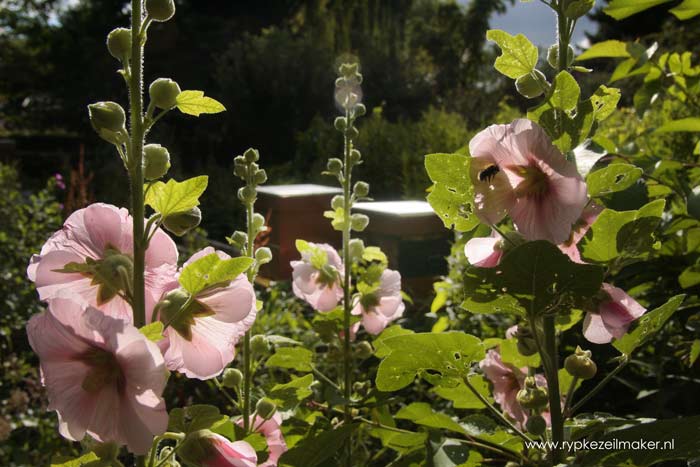Britse krant The Times meldt hoe Nederlandse wetenschappers betrokken bij Wereld Natuur Fonds en IUCN in 2010 uit activistische overwegingen ‘ bewijs’ tegen de pesticidegroep neo-nicotinoiden fabriceerden, 0m zo via het Europarlement een ban op deze stoffen af te dwingen, zoals in 2013 gebeurde. Een van hen is de mede-oprichter van het Wereld Natuur Fonds in Nederland, Maarten Bijleveld van Lexmond. Hier het bericht:
Research blaming pesticides for the decline in honeybees has been called into question by a leaked note suggesting that scientists had decided in advance to seek evidence supporting a ban on the chemicals.The private note records a discussion in 2010 between four scientists about how to persuade regulators to ban neonicotinoid pesticides.
The EU imposed a temporary ban last year after the European Food Safety Authority identified risks to bees. The Department for Environment, Food and Rural Affairs opposed the ban, saying that there was not enough evidence of harm to bees.
Many farmers have blamed the ban for high levels of damage to this winter’s oilseed rape crop from flea beetle.
The leaked note says that the scientists agreed to select authors to produce four papers and co-ordinate their publication to “obtain the necessary policy change, to have thesepesticides banned”.
A paper by a “carefully selected first author” would set out the impact of the pesticides on insects and birds “as convincingly as possible”. A second “policy forum” paper would draw on the first to call for a ban.
The note, which records that the meeting took place in Switzerland on June 14, 2010, says: “If we are successful in getting these two papers published, there will be enormous impact, and a campaign led by WWF etc. It will be much harder for politicians to ignore a research paper and a policy forum paper in [a major scientific journal].”
The scientists at the meeting included Maarten Bijleveld van Lexmond, chairman of the Task Force on Systemic Pesticides, and Piet Wit, chairman of the ecosystems management commission of the International Union for Conservation of Nature, an influential network of scientists and environmental groups.
The Task Force, a group of scientists who advise the IUCN, published a report in June stating that neonicotinoids were “causing significant damage to a wide range of beneficial invertebrate species and are a key factor in the decline of bees”.
The Task Force used the report to call on regulators to “start planning for a global phase-out” of neonicotinoids. The present two-year EU ban, which began last December, is due to be reviewed next year using evidence from field trials. Thousands of farmers who use neonicotinoids are hoping that the trials, overseen by the Centre for Ecology and Hydrology, will show that the risks to bees have been overstated.
Nick von Westenholz, chief executive of the Crop Protection Association, which represents Bayer and Syngenta, manufacturers of neonicotinoids, said: “The work of the Task Force is regularly cited by activists as being strongly independent research, conducted with the utmost scientific rigour.
“From reading this document it looks to me that this group decided on its conclusions first and then embarked on the research to back them up. That clearly flies in the face of claims that the IUCN study represents independent and rigorous science. The claims of the Task Force now seem increasingly suspect and I hope that policymakers will treat these studies with an appropriate degree of caution.”
Mr Wit said that the leaked note was accurate but he denied that the scientists had decided the conclusions of the research in advance. Dr Bijleveld van Lexmond, a founding member of WWF in the Netherlands, said that the Task Force was independent and unbiased.
Ik schreef het al vaker: bedenk dat de coatings rond zaden van neonicotinoiden juist waren bedacht als MILIEUMAATREGEL. Je hebt nog maar een 100ste nodig van de hoeveelheid pesticiden. Daarnaast toont veel onderzoek dat juist de afname van dracht, bloemen en bloemsoorten in het (agrarische) land een minstens zo belangrijke drukfactor is die maakt dat de omgeving minder geschikt wordt voor diverse bijensoorten. Tel daarbij de parasiet varroamijt, en het eenzijdig hameren op pesticiden is meer iets dat we van onze milieuvrinden kennen: het opblazen van halve waarheden om de aandacht op je eigen giro te vestigen.
Bent u bij uw psychiater gediagnosticeerd als pathologische leugenaar? Bij de milieubeweging wacht u een gouden toekomst.







Engelsen hebben hier een toepassende uitdrukking voor: “Noble cause corruption”. WWF en Greenpeace zijn hier meesters in.
En was er niet een Frans onderzoek dat niet klopte?
Vraag me af of het ook in de Graudian wordt gepubliceerd…
Tinstaafl: Op de een of andere manier pikt ClimateGate mijn aanvulling in de discussie over bijensterfte niet. Ik ben webmaster van euleev.nl en heb 48 pagina’s over de bijensterfte vertaald. Dat behelst het hele verhaal rondom de bijensterfte en bevat componenten die de meeste onderzoekers ontgaan zijn omdat uit wetenschappelijke sudies de vervlechtingen meestal niet te zien zijn, noch het criminele menselijk handelen. Je kunt de bijen Uilenspiegel 1-2/2014 gratis downloaden.
Bee-gate
Wanneer wetenschappers verworden tot activisten , wordt leugen tot waarheid verheven. Zo sprak dagblad Trouw deze week over 18 “groene hoogleraren” van de universiteit van Wageningen. Ze moesten per ommegaande de laan worden uitgestuurd, want van dit soort lieden kun je niet verwachten dat ze onafhankelijk, kritisch onderzoekswerk leveren.
Zouden ze dit van de ‘klimaatwetenshap” hebben afgekeken?
Climate-gate, Bee-gate, de volgende wordt ……….. Schaliegas-gate (……..of hoe bashen we GroenePies-activist Diederik Samsom?).
http://www.spiked-online.com/newsite/article/ten_big_fat_lies_about_fracking/13944#.VIChOtuCOrU
De betreffende publicatie:
http://download.springer.com/static/pdf/719/art%253A10.1007%252Fs11356-014-3220-1.pdf?auth66=1417720918_bf9ea6385cb74f6aee2e1308da414666&ext=.pdf
Ik begin er maar weer eens over: alle publicaties van belang en gebruikt voor het uitstippelen van beleid dienen onder verantwoordelijkheid van een academisch-wetenschappelijke instelling tot stand te komen.
Alleen daar kan men instaan voor de wetenschappelijke integriteit.
Om het sluitend te maken: wetenschappers vallen 24/7 onder het regiem van de wetenschappelijke integriteit.
Zeker, bij voorbeeld onder toezicht van KNAW … oh pardon.
Dit verhaal verbaast ons natuurlijk niets. Het stemt alles bij elkaar diep triest. Maar u weet: biochemie en life sciense enz. etc. moeten kapot. Dat is de duivel, behalve natuurlijk wanneer je als redder van de planeet in het ziekenhuis terecht komt. Dan gaan ze opeens voor de nanobodies en is de brandnetelsoep voor Fikkie.
Kijk met je bolle ogen naar het rijstprogramma van Syngenta en zie wat dat gaat betekenen voor de hongerlijders van India. Kijk dan met je bolle ogen naar de verzamelde groene fopwetenschap en zie wat het WWF betekent voor de hongerlijders van India.
Terwijl ik dit type verbijt een waddenvisser op NL 1 zijn woede, tranen en verdriet omdat zijn boot door de Groene ISIS uit de vaart wordt gehaald. Levenswerk en pensioen naar de haaien. De Waddenzee ligt er neutraal bij. Dat heb je zo met natuur; die kiest geen partij.
Kunnen we poetverdoeme die de aarde niet verdelen: Eén deel voor de Groenliesbeths en Didis en andere mensenhaters, het andere deel voor de mensen die wel vooruit willen?
Ik weet dat het nu nog een beetje dromerig is, maar dat er ooit een agressief bijtende waakhond “wetenschappelijke integriteit” gaat komen is voor mij evident.
Omdat beleidsbepalers steeds vaker staan in de hoek waar de verkeerde, misleidende adviezen vallen.
“Bouls”
Ik help het je hopen. Voorlopig is de tendens omgekeerd: ‘Slimme’ politici willen de kans op advies dat hun (private) doelen niet ondersteunt zo klein mogelijk houden. Die kunnen alles gebruiken behalve (publieke) twijfel. In hun ogen is er al twijfel genoeg. Wat is er dan handiger als je zelf je wetenschappelijke waarheid bij elkaar kunt shoppen?
http://climategate.nl/2014/11/16/europa-vindt-evidence-based-beleid-niet-meet-nodig/
En weer zwijgen de Nederlandse kranten……………